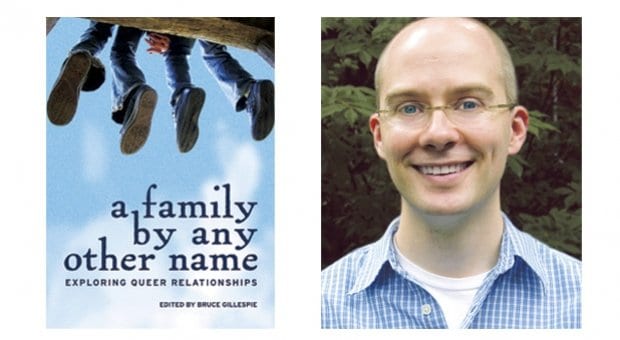I once mentioned my family in passing and was stopped in mid-sentence. “You don’t have kids. You mean your boyfriend and your dog?”
“Yes,” I said, “My family.”
My memory might be embellishing, but I think there was an eye-roll at this. Nevertheless, I have not stopped using the phrase.
“I think queer people have always been very good at choosing who they consider family and creating a much broader range of what a family can be,” says Bruce Gillespie, editor of the new essay collection A Family by Any Other Name: Exploring Queer Relationships. The fifth in a series of books from TouchWood Editions about “the changing nature of the family in the 21st century,” it’s a book Gillespie felt had become necessary.
“In some ways, we’ve become complacent about same-sex rights in Canada because we’ve had same-sex marriage for a reasonably long period of time,” he says, “but I think it’s timely to explore where families are today and how they’re different.”
Gillespie approached a wide range of queer authors and collected “adoption stories, insemination stories, marriage stories, and I left it open for other things … I loved getting a story on gay divorce because I’d never even considered that at first,” he says, also citing Ellen Russell’s powerful story of losing her partner to cancer as a haunting example.
The book’s gentle blue cover doesn’t prepare readers for more than a few harrowing tales of struggle. Xtra’s managing editor, Danny Glenwright, reveals how he and his partner endured racism in South Africa, while journalist Noreen Fagan writes of the tortuous process of uprooting her family from Zambia to Canada, where her son Sebastian declares at Pearson Airport immigration, “Mum, I like this country. That was the first time we’ve ever been called a family.” Jason Dale, a teacher in Port Dover, writes of his agonizing struggle to adopt a child from foster care and “wishing that every parent was vetted so thoroughly before conceiving or raising children.” Double standards abound, but, as nearly every author within asserts, the fight for family is worth it, even if some of us struggle with the definition.
“I saw that firsthand when I started collecting stories,” Gillespie says. “One said, ‘You may think I fit what you’re looking for in the word ‘family,’ but I find that word totally offensive.’ It’s a word that’s so loaded, and it’s been used by the religious right for such a long time, but I wanted this book to say that we are family. Whether we’re married or in civil unions or polyamorous or monogamous or we have children or we don’t, all these supportive communities of people who care for each other are families.”
“I find ‘family’ to be a very lovely idea indeed, but it can also be incredibly restrictive and vindictive,” says Berlin-based writer Paul Aguirre-Livingston, whose essay was written over a dismal Christmas when his family failed him. “I don’t believe in ‘queering’ definitions, nor in ‘institutions’ like marriage or family,” he says. “I would suggest we champion words like ‘clan’ or ‘household’ or ‘kin.’ Fuck, call it ‘dynasty’ if you want. How’s that for fabulous?”
Toronto theatre critic Dorianne Emmerton writes of incorporating a partner’s child into her poly family and says, “I think that if you’re raising kids, whether you’re in a same-sex couple, an opposite-sex couple, a triad or as a single person, if you’re raising kids in a way that consciously resists socialized gender expectations, then that is queering family and it’s really crucial.”
Or perhaps not. “I really enjoyed Dorianne Emerton’s piece because it challenged my ideas about relationships and parenting,” says Vancouver playwright Rosemary Rowe. But she disagrees about the kids. Her essay, “Aspiring Lesbian Aunt,” is a hilarious manifesto on not having children. “I didn’t want to come off like a jerk who’s saying, “Parenthood, I shit on it! I shit on your parenthood!” she says, laughing, but notes, “I love that we’ve reclaimed the word queer and I love that we appear to have reclaimed ‘family,’ too.”
Calgary poet and editor Dale Lee Kwong says her contribution was cathartic. “I believe in full disclosure,” she says. “Secrets create shame, and I suspect our personal situations are more universal than we realize. I had one painful family anecdote I debated whether to share, and in the end I convinced myself it was vital that I didn’t hide the incident or candy coat it.”
That kind of honesty and openness is what Gillespie hoped for with this book, and his contributors rose to the challenge. His only regret is that the widely praised final piece by trans storyteller S Bear Bergman was also featured in the author’s own collection Blood, Marriage, Wine and Glitter, published earlier this year (“His book made it to market first!” he says, laughing), but Bergman was delighted to take part in this collection:
“I often hear people say it takes a village to raise a child, because that’s the quote that Hillary Clinton popularized. But I hear from people who I’d trust to know that the actual quote is ‘It takes a village to raise a villager.’ And that seems more true to me, and also like more of a challenge. What strikes me about the pieces in this book is that many of these people are doing exactly that — I really appreciate their company.”
A Family by Any Other Name: Exploring Queer Relationships
Edited by
Bruce Gillespie
TouchWood Editions
$19.95


 Why you can trust Xtra
Why you can trust Xtra


